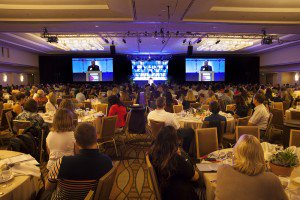By Anca Gagiuc on May 23, 2014 in News
Conferences have become a booming business. Every year 1.8 million trade shows, conventions, expos, and other related meetings take place in the U.S. alone. A recent study observed the economic significance of meetings to the U.S. economy and the figures are staggering: 1.7 million jobs, $262 billion in spending, $60 billion in contribution to GDP, $60 billion in labor revenue, $14.3 billion in federal tax revenue, and $11.3 billion on state and local tax revenue.

As we welcome our guests to the Yardi Advanced Solutions Conference, beginning next week in Washington, D.C. it’s worth asking: As an attendee, are you getting the most out of the conference experience?
Before booking, make sure that you know why you’re attending and think strategically about how you’ll maximize the experience. The most common reasons are networking, finding leads, learning, and building your brand.
The next thing to be considered is the administrative part. The sooner you book, the less you pay for plane tickets and hotel room, and if you start really early, chances are that you will find accommodation at the event hotel or within walking distance, thus avoiding hidden travel costs and inconveniences. You might even want to get there a day early, annulling jet lag and giving you time to explore.
Before you leave for the trip, join the event’s social network and/or email list. Stock up on business cards and plan how to organize the ones you will collect. Know what season to expect and dress and pack accordingly. Comfortable shoes are a must, as are the portable battery packs for your mobile phone and chargers for all your devices. A personal Wi-Fi hotspot is priceless in a location where the devices outnumber the attendees. Make sure you stay hydrated, watch what you eat (having some healthy snacks in your bag can be a mood-savior), and during happy hour, remember to drink plenty of water.
If you love technology as much as I do, you know that it’s not perfect. Smart event planners will provide an easy schedule guide to every speaker and event at the conference, but probably still in a print format. Focus on one note taking solution – laptop, tablet, notebook – and decide if you have enough battery power to take photos (they are unmatchable assets for social media and blogs).
‘Early’ is an important time in business and it applies at conferences also. Showing up early means access to good seats and leaves time to mingle, meet attendees and set up in-person meetings. Diversity is key – plan on meeting a certain number of new people each day, if possible with different backgrounds and experiences. Put your name tag somewhere – if possible, avoid hanging it around your neck; instead, put it high on your chest and next to the shoulder of the arm you shake hands with – this way it’s directly in the line of sight of the people you greet.
Stick to your schedule, but don’t leave out the “fun” events like meet-ups and happy hours – this is where the real relationships form, when the managers unwind and show their relaxed faces to the crowd. Rather than spending your evenings at the hotel, organize a dinner and invite the people you wish to know. Networking requires some sharp strategic abilities; focus on your business’ objectives: recruiting, discovering and collecting competitive intelligence, and prospecting for new clients.
If you’re transmitting social media updates from the conference, try to use the events and people to come up with curated and useful content. Use pictures and quotes and post them throughout the day to attract those who couldn’t attend, make lists with the most memorable speakers, lessons, and tools you’ve come across; use the event #hashtag to increase visibility.
Because you are the lucky one who got to represent your team at the conference, share in a clear manner the riches you’ve learned while away. Ask them beforehand what their center of interest at the event is and focus on bringing back as many answers as possible. Look for materials that suit their needs and consider holding a presentation once you return from the conference.


